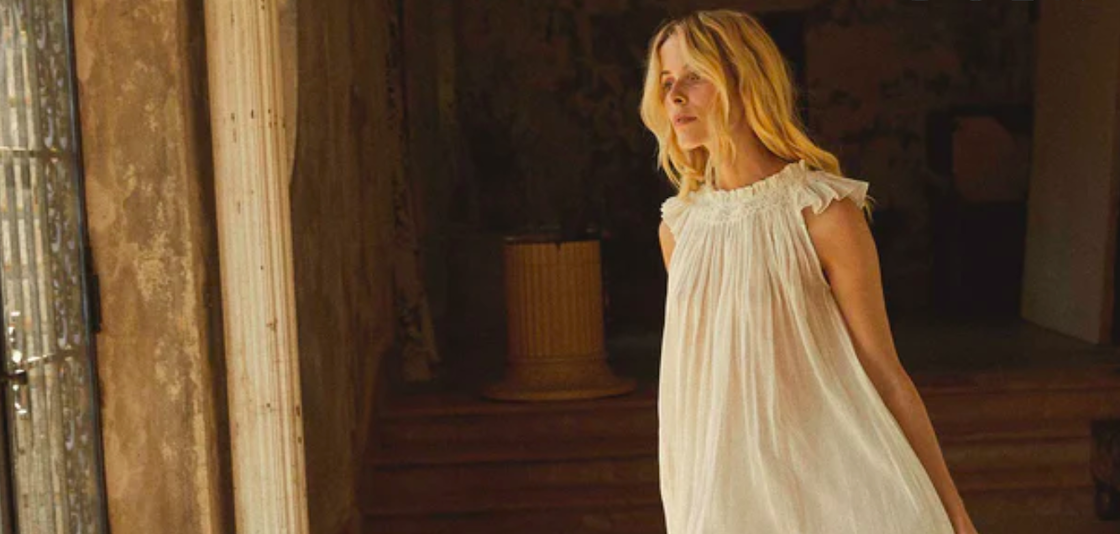As the fashion resale renaissance has continued, fashion brands are increasingly interested in bringing resale in-house. Usually, that takes the form of a peer-to-peer model and a dedicated section of the website. But California-based premium fashion brand Dôen is taking a different approach, recruiting a resale expert from Patagonia to help build a resale business meant to last.
Dôen’s resale program, called Hand Me Dôen, launches this month. Dôen built out a buyback portal on its website with resale service Treet, where customers can send in pre-owned Dôen products in exchange for store credit. All used products taken in will be authenticated in Dôen facilities. Then, rather than making approved products available for purchase all the time, Dôen will host flash sales throughout the year when the resold product becomes available. Dôen typically attracts more than 5,000 people to its in-person sample sales. It will use similar marketing methods like email blasts and social posts to let customers know about the resale flash sales.
In essence, it’s the drop model but for resale. The first flash sale will be in December and more products will drop irregularly based on inventory, demand and other factors. The goal of not making resale available all the time, according to Dôen’s president Holly Soroca, is to prevent customers from visiting the site and finding it already picked over. Instead, Dôen will save up enough inventory so that there is a healthy selection of styles and sizes when the flash sale drops. Dôen clothing typically ranges from $100-$500. Each flash sale will remain open until every piece sells out.
“Sometimes you go to a brand’s resale section and they only have 10 things available at a given moment,” said Nellie Cohen, the former Worn Wear director at Patagonia and current director of circular business models at sustainable business consultancy Anthesis Group. “It’s a better experience to let customers know ahead of time when it’s open and have a nice selection ready for them.”
Dôen, which has been profitable since it launched in 2015 and has an average order value of around $400, is investing heavily in this space. Soroca declined to say exactly how much the company has spent on building up resale. The company hired Cohen as a consultant, plus it has an internal project team, led by a newly created role of recommerce project manager, to help manage the new program.
“It would have been a lot easier to jumpstart recommerce if we did a peer-to-peer program with some third-party company,” said Soroca. She said Dôen didn’t take that approach because, in those relationships, the brand typically has little control over the customer experience and product quality.
“We want to have a robust recommerce program in 10-15 years,” Soroca said. At this point, the brand does not have set milestones in place. “We want it to be integrated, so you can check out new products and pre-loved products in the same cart. We’re building up the groundwork now to set this up to be a long-term part of our business.”
In the years since Patagonia began Worn Wear in 2017, a slew of brands like Adidas, Madewell, Fabletics, Lululemon and Arc’Teryx launched their own in-house programs. The number of fashion brands with their own resale shops increased by 275% between 2020 and 2022, according to ThredUp. But in the last year, many have done so on a peer-to-peer model.
Data from Morning Consult shows that consumers almost equally shop peer-to-peer resale and consignment resale, but there are a few points in favor of Dôen’s chosen path of consignment. Product quality and authenticity are the two top concerns for resale shoppers, and it’s much easier to authenticate when the product is passing through the brand’s hands.
On the brand side, an owned consignment model means there’s more control over how product is presented and more opportunities to interact with the customer for marketing purposes like retargeting and data collection.
Soroca said Dôen modeled its recommerce program on Patagonia’s Worn Wear, which Cohen helped develop, saying that it was the gold standard for how brands should approach resale. Worn Wear sold more than 150,000 products in its first three years.
“It was important for us to ensure every product passes through our hands and every product is what it says it is,” Soroca said. “We really couldn’t achieve the experience we wanted without putting in nearly two years of work ahead of time.”




